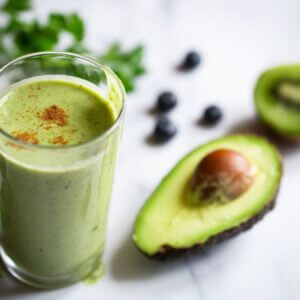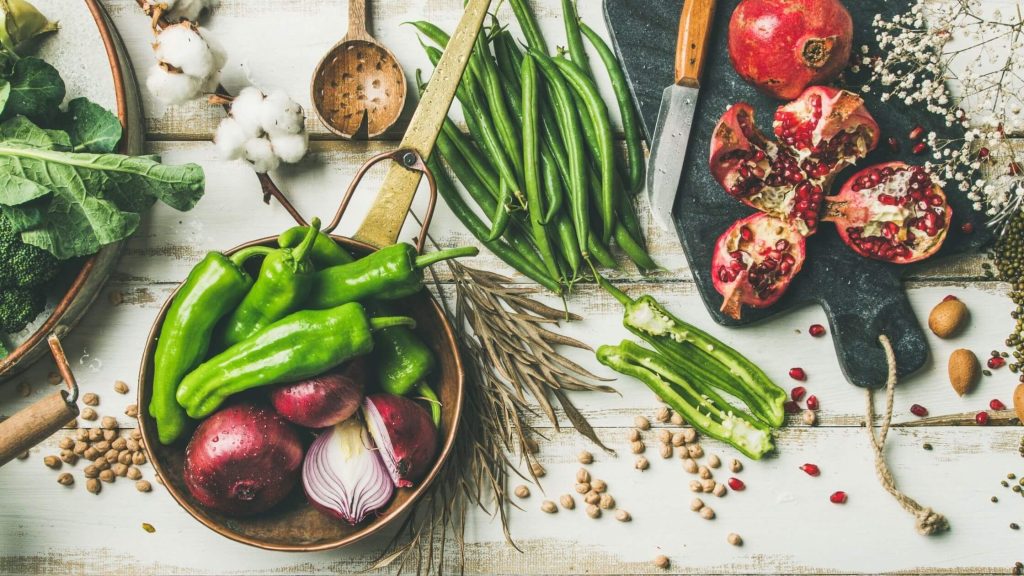We all know that what you put in your system impacts your physical health. Eat healthy food and your body will run properly each day, but eat copious amounts of junk food and you’ll feel sluggish, sick and likely put on weight. We all know the physical impacts of eating healthy.
Did you know that what you put in your body can have an impact on your mental health, too?
As the temperature drops and winter truly kicks in, it’s time to start prioritizing your mental health, too. Every year millions of people suffer from Seasonal Affective Disorder, and while there’s no sure-fire cure, there are certainly things you can do. Exercise, sleep and food go hand in hand – So why not check out our five tips on beating the winter blues below!
Add More Greens To Your Diet 
I’m sure we all remember our parents telling us to ‘eat your greens!’ Well, it turns out they weren’t wrong!
While greens aren’t always the tastiest things to eat, particularly if they’re just steamed or boiled in salted water, the health benefits that a simple Kale Salad can give you are well worth adding them to your diet more often.
Several greens are well-known to be high in Magnesium, and an article published in the US National Library of Medicine suggests that the amount of magnesium in your system can have an impact on your mental health. Many people suffering from mental health issues report low levels of magnesium [1], and while results aren’t conclusive for everyone, increasing your magnesium intake may help to improve your mood.
There are plenty of healthy greens that can help you to do just that!
Leafy greens such as spinach, kale, broccoli and mustard greens are highest in magnesium, and adding just one cup of cooked spinach to your diet each day can help to meet 40 percent of your daily magnesium needs [2]. One cup of broccoli can also provide 21mg of Magnesium, which is 15 percent of your recommended intake. Being plentiful during the cooler months, both of these greens are widely available at Earth Markets stores around the Gold Coast. Add them to a winter soup, stir fry them in your favourite Asian sauce or roast with Garlic for a delicious winter treat.
Ensure You Get Enough Vitamin D
Vitamin D is typically known as the ‘sunshine’ vitamin as our bodies can naturally absorb it from the sun – But when the days are colder and there is less sunshine, how do you keep up?
Well, the answer is simple. Get your Vitamin D from food!
For meat-eaters, fish such as Salmon, Herring and Sardines are all good choices, but for those living a vegan or vegetarian lifestyle, you need an alternative. Well, mushrooms are that alternative!
Similar to the way in which humans produce Vitamin D3 when exposed to the sun, mushrooms also produce Vitamin D2, making them a great plant-based alternative for those needing to get more Vitamin D. Research published in the US National Library of Medicine suggests that having insufficient levels of the ‘sunshine’ Vitamin may be linked to a decline in mental health [3], so ensuring you get sufficient amounts of the ‘sunshine’ Vitamin from your food is vitally important.
Great to eat raw in salads, sautee with garlic or add to your favourite pizza or pasta dish, there is no end to the number of ways that you can incorporate mushrooms to your diet. In season all year round and direct from the farmers, there are plenty of mushrooms that you can pick up from Earth Markets. There’s even a few varieties not available in regular stores!
Add Some Crunch To Your Meals
Are you a fan of the crunch? We’re all familiar with adding crunchy foods such as Walnuts, Flax Seeds and Chia seeds to our meals, but research has shown that they can do much more than just add crunch to our salads. They’re actually incredibly high in Omega 3 as well!
While further research into the topic still needs to be done, Omega 3 plays a vital role in the development and function of the human brain, and as such having an insufficient intake of Omega 3 may leave you more likely to develop the winter blues [5]. High in Omega 3 fatty acids, consuming just 100 grams of Walnuts can provide you with 568% of your adequate intake, and 100 grams of Chia Seeds can provide over 1000 percent of the adequate intake [4]. Turns out that adding chia seeds to your morning smoothie or porridge isn’t such as bad idea after all!
Available from Earth Markets stores, next time you’re doing your weekly grocery shop, don’t forget to add a bag of nuts from JC’s Quality Foods to your shopping cart. Your stomach will thank you at the time, and your mental health will thank you later!
Don’t Be Afraid To Try New Things
Winter is the season for cooking. Hot soups, roast dinners and hearty meals are all high up on the wish list during the colder evenings, and we often end up spending hours in the kitchen preparing. If you’re one of those people who enjoys cooking, and isn’t afraid to experiment a little in the kitchen, why not try your hand at cooking the super-food Artichokes.
While you’ve probably heard of them before, you may not be familiar with them. Essentially, Artichokes are the flower of a thistle, and as luck would have it, they’re incredibly high in antioxidants! Tasting similar to Brussels Sprouts, Turnips or Asparagus, Artichokes can be cooked and enjoyed in a wide variety of ways, but the easiest way is to simply boil them and then scoop out the centre. There’s a really simple recipe here that you can try if you’re up for the challenge that this flower presents. Once you’ve mastered the art of cooking the, you can grill them, fry them, or mix them into a dip!
Available primarily during Spring and Autumn, Artichokes will be coming into season in the coming weeks and months. If you’ve ever been keen to try this unique vegetable out, add it to your recipe list!
Eat More Whole Foods 
We all know that eating fresh produce is good for our physical health, but it turns out that eating our veggies is good for our mental health, too!
Research published by Sutter Health in the USA has indicated that what you include in your diet can greatly influence how you feel, not just physically, but mentally as well. A diet high in sugar and processed foods has been linked to poor physical health and decreased mental abilities [7], while prioritizing more whole foods in your diet can help you to feel happier, healthier and live longer.
Sugar and flour, both being processed foods, are two of the main culprits. They stimulate the dopamine sensors in our brains and cause us to feel happy when we consume these foods. While this is good in the short term, a few hours after eating we can often find ourselves crashing, causing our mood to plummet and our body to crave more processed foods.
The best way to prevent this? Cut processed foods out of your diet as much as you can, and focus on the whole foods instead. While cutting sugar and other processed foods out of your diet can be difficult at first, it’ll cause your body to feel better, your mind to feel clearer and your hormones to be more stable in the long run.
If you want to focus on your health this winter, it’ll be worth it.

